Today Current Affairs: 8th April 2021 for UPSC IAS exams, State PSC exams, SSC CGL, State SSC, RRB, Railways, Banking Exam & IBPS, etc
Table of Contents
Monetary Policy: Short Term Lending Rate Or The Repo Rate Unchanged:
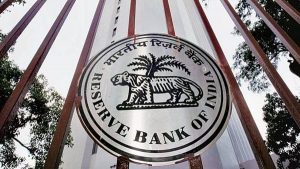
The Reserve Bank of India’s Monetary Policy Committee (MPC) has decided to keep its short-term lending rate or the repo rate unchanged at 4 percent, in line with market expectations.
- Announcing the monetary policy, RBI Governor said the central bank will maintain its ‘accommodative stance’ as long as required to sustain growth on a durable basis.
- The RBI maintained its GDP growth forecast at 10.5 percent for 2021-22.
- RBI also announced a series of measures to inject liquidity in the government securities market and the financial system.
- RBI will ensure the orderly conduct of government borrowing programs.
- In this respect, the central bank announced a secondary market government securities (G-sec) acquisition plan worth Rs 1 lakh crore for April-June.
- Amid the government plans to support a new asset reconstruction company being set up by banks, the RBI has decided to set up a committee to review the working of ARCs to ensure how better these entities can support the financial sector.
- In the policy review, the RBI decided to extend the RTGS and NEFT payments platforms to prepaid payment instruments, white label ATMs as well.
Production Linked Incentive (PLI) Scheme For White Goods (Air Conditioners And LED Lights):
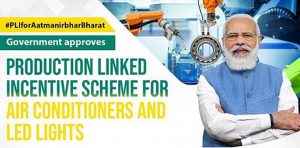
The Union Cabinet approved the Production Linked Incentive (PLI) Scheme for White Goods (Air Conditioners and LED Lights) with a budgetary outlay of Rs. 6,238 crore.
- The PLI Scheme for White Goods shall extend an incentive of 4% to 6% on incremental sales of goods manufactured in India for a period of five years to companies engaged in manufacturing Air Conditioners and LED Lights.
- An entity availing benefits under any other PLI Scheme of Govt. India will not be eligible under this scheme for the same products but the entity may take benefits under other applicable schemes of Govt. of India or schemes of State governments.
- The Scheme will be implemented as a pan India scheme and is not specific to any location, area, or segment of the population. A number of global and domestic companies, including a number of MSMEs are likely to benefit from the Scheme.
- Benefits: It is estimated that over the period of five years, the PLI Scheme will lead to an incremental investment of Rs. 7,920 Crore, incremental Production worth Rs. 1,68,000 Crore, exports worth Rs 64,400 Crore, earn direct and indirect revenues of Rs 49,300 crore and create additional four lakh direct and indirect employment opportunities.
White goods:
- A major appliance, also known as a large domestic appliance or large electric appliance is a non-portable or semi-portable machine used for routine housekeeping tasks such as cooking, washing laundry, or food preservation.
- Such appliances are sometimes collectively known as white goods, as the products were traditionally white in colour, although a variety of colours are now available.
MoU Signed Between India And Japan:
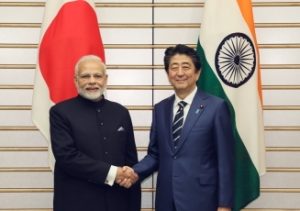
The Union Cabinet is apprised of an MoU signed between National Atmospheric Research Laboratory (NARL), Dept of Space, Government of India and Research Institute for Sustainable Humanosphere (RISH), Kyoto University, Kyoto, Japan for Academic and Research Cooperation and Exchange in November 2020.
- This MoU shall enable NARL and RISH to continue their cooperation in areas of atmospheric science and technology.
- This MoU would lead to mutual utilization of facilities such as the Middle and Upper atmosphere (MU) radar in Shigaraki, Japan, the Equatorial Atmosphere Radar (EAR) in Kototabang, Indonesia, etc.
- NARL and RISH have been collaborating in the area of atmospheric science and technology as well as the exchange of scientists.
- This arrangement was formalised in 2008 through an MoU which was renewed in the year 2013.
- A fresh MOU to promote collaborative research, as per the new guidelines, was signed in November 2020 by both sides and exchanged.
Italian Marines Case::

The government has asked the Supreme Court to schedule an urgent hearing of its application to close the criminal trials pending in India against two Italian marines accused of killing two fishermen off the coast of Kerala in 2012.
- Girone and Latorre, who were detained on the Italian ship Enrica Lexie, allegedly shot the fishermen thinking they were ‘pirates’.
- In a virtual hearing in August last year, the court had made it clear that it would close the criminal trial of the Marines in India only after the victims’ families were heard and paid a ‘hefty’ compensation. The court had asked the government to negotiate an ‘adequate’ compensation for the slain fishermen’s families with Italy.
- Eight months ago, the Centre had informed the apex court about its decision to “accept and abide” by an international tribunal’s award that the Marines should be tried in their native Italy.
- The government had explained that India was bound by the award of the arbitral tribunal formed under the United Nations Convention on the Law of the Sea (UNCLOS).
- The award was “final and without appeal” as India was a party to the UN Convention
- In a close 3:2 vote, the tribunal ruled that the Italian marines enjoyed diplomatic immunity as Italian state officials under the United Nations Convention on the Law of Sea.
- Taking note of the “commitment expressed by Italy” to resume its criminal investigation into the incident, the tribunal said India must cease to exercise its jurisdiction.
Government Security Acquisition Programme (G-SAP) 1.0:

The Reserve Bank of India (RBI) has put in place a secondary market Government Security Acquisition Programme (G-SAP) 1.0 for orderly evolution of the yield curve in FY22.
- Under the programme, the central bank will purchase government bonds of worth Rs 1 trillion (or one lakh crores of rupees).
- The GSAP 1.0 will provide more comfort to the bond market. As the borrowing of the Government increased this year, RBI has to ensure there is no disruption in the Indian market.
- The programme will help to reduce the spread between the repo rate and the ten-year government bond yield.
- The G-SAP will almost serve the purpose of an OMO calendar, which had been on the bond market’s wish list for a long time.
- Open market operations are the sale and purchase of government securities and treasury bills by RBI or the central bank of the country.
- The objective of OMO is to regulate the money supply in the economy.
- It is one of the quantitative monetary policy tools.
- RBI carries out the OMO through commercial banks and does not directly deal with the public.
Cultivation Of Opium:
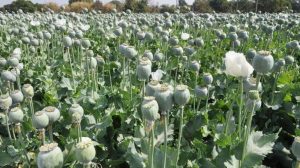
The Union government has decided to rope in the private sector to commence production of concentrated poppy straw from India’s opium crop to boost the yield of alkaloids.
- Alkaloids are used for medical purposes and exported to several countries.
Cultivation of opium:
- Only a few countries are permitted to cultivate the opium poppy crop for export and extraction of alkaloids.
- India currently only extracts alkaloids from opium gum at facilities controlled by the Revenue Department in the Finance Ministry.
- This entails farmers extracting gum by manually lancing the opium pods and selling the gum to government factories.
- India’s opium crop acreage has been steadily declining over the years and using the CPS extraction method is expected to help cut the occasional dependence on imports of products like codeine (extracted from opium) for medicinal uses.
Ukraine To Join A NATO Membership Action Plan:

Ukrainian President urged the North Atlantic Treaty Organization (NATO) to speed up his country’s membership in the alliance.
- Ukraine hopes to be invited this year to join a NATO Membership Action Plan (MAP).
Reasons for Ukraine to Join NATO:
- Ukraine is of the opinion that joining NATO is the only way to end fighting with pro-Russia separatists.
- There is an increase in clashes and Russian military movements on the border raise fears of an escalation of the separatist conflict in eastern Ukraine.
- Ukraine accuses Russia of massing thousands of military personnel on its northern and eastern borders as well as on the Crimean peninsula (annexed by Russia in 2014).
- Ukraine’s Western allies have rushed to its defense, with a series of statements warning Russia against taking further action.
- India did not join the Western powers’ condemnation of Russia’s intervention in Crimea and kept a low profile on the issue.
About North Atlantic Treaty Organization (NATO):
- It is a military alliance established by the North Atlantic Treaty (also called the Washington Treaty) of 4th April 1949, by the United States, Canada, and several Western European nations to provide collective security against the Soviet Union.
- It is headquartered in Brussels, Belgium.
- A key provision of the treaty, the so-called Article 5, states that if one member of the alliance is attacked in Europe or North America, it is to be considered an attack on all members. That effectively put Western Europe under the “nuclear umbrella” of the US.
- NATO has only once invoked Article 5, on 12th September 2001, following the 9/11 attacks on the World Trade Center in the US.
- NATO’s protection does not extend to members’ civil wars or internal coups.
- As of 30th March 2021, there are 30 member states, with the Republic of North Macedonia becoming the latest member to join the alliance in 2020.
Tribal Health Collaborative (THC) ‘Anamaya’: Ministry Of Tribal Affairs:

The Ministry of Tribal Affairs has launched Tribal Health Collaborative (THC) ‘Anamaya’ through a video conference.
- In 2018, an expert committee released a comprehensive report on tribal health in India which highlighted the issues and concerns of tribal health.
- It is an initiative bringing together governments, philanthropists, national and international foundations, Non-Governmental Organizations (NGOs)/Community Based Organizations (CBOs) to end all preventable deaths among the tribal communities of India.
- It will converge efforts of various Government agencies and organizations to enhance the health and nutrition status of the tribal communities of India.
- Aim:
- To build a sustainable, high-performing health ecosystem to address the key health challenges faced by the tribal population of India.
Stakeholders: - It is a multi-stakeholder initiative of the Ministry of Tribal Affairs supported by Piramal Foundation and Bill and Melinda Gates Foundation (BMGF).
- Piramal Foundation is the philanthropic arm of Piramal Group. The foundation undertakes projects under the four broad areas – healthcare, education, livelihood creation, and youth empowerment.
- To build a sustainable, high-performing health ecosystem to address the key health challenges faced by the tribal population of India.
- It will begin its operations with 50 tribal, Aspirational Districts (with more than 20% Scheduled Tribe population) across 6 high tribal population states.
- Over a 10-year period, the work of the THC will be extended to 177 tribal Districts as recognized by the Ministry of Tribal Affairs.
An Iranian freighter Was Hit By Israel In The Red Sea:

An Iranian freighter was hit by Israel in the Red Sea in retaliation for past Iranian strikes on its vessels. The blast struck the Iranian commercial vessel MV Saviz off the coast of Djibouti.
- The attack came as Iranian officials gathered in Vienna to negotiate the restoration of a 2015 deal Joint Comprehensive Plan of Action (JCPOA) that was designed to curb Iran’s nuclear activities.
Red Sea:
- The Red Sea is a semi-enclosed tropical basin, bounded by northeastern Africa, to the west, and the Arabian peninsula, to the east.
- The elongated and narrow-shaped basin extends between the Mediterranean Sea, to the north-west, and the Indian Ocean, to the south-east.
- At the northern end, it separates into the Gulf of Aqaba and the Gulf of Suez, which is connected to the Mediterranean Sea via the Suez Canal.
- At the southern end, it is connected to the Gulf of Aden, and the outer Indian Ocean, via the Strait of Bab-el-Mandeb.
- It is surrounded by desert or semi-desert areas, with no major freshwater inflow.
Indian Energy Exchange (IEX):
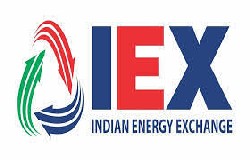
The electricity market at Indian Energy Exchange (IEX) achieved an all-time high volume of 8,248.52 MU (million units) in the month of March 2021 surpassing all the previous milestones.
- It is the first and largest energy exchange in India providing a nationwide, automated trading platform for physical delivery of electricity, Renewable Energy Certificates and Energy Saving Certificates.
- The exchange platform enables efficient price discovery and increases the accessibility and transparency of the power market in India while also enhancing the speed and efficiency of trade execution.
- It is a publicly listed company with National Stock Exchange (NSE) and Bombay Stock Exchange (BSE).
- It is approved and regulated by Central Electricity Regulatory Commission (CERC) and has been operating since 2008.
Mission:
-
- To leverage technology and innovation to establish transparent and efficient energy marketplaces for delivering affordable, reliable energy to consumers.
Trading Platform for:
- Physical Delivery of Electricity:
- Day-Ahead Market (DAM):
- Term-Ahead Market (TAM):
- The contracts under TAM cover a range for buying/selling electricity for a duration of up to 11 days.
- It enables participants to purchase electricity for the same day through intra-day contracts, for the next day through day-ahead contingency, on a daily basis for rolling seven days through daily contracts.
Renewable Energy Certificates (REC):
- Under the REC mechanism, a generator can generate electricity through renewable resources in any part of the country.
- For the electricity part, the generator receives the cost equivalent to that from any conventional source while the environment attribute is sold through the exchanges at the market-determined price.
- The obligated entity from any part of the country can purchase these RECs to meet its RPO (Renewable Purchase Obligation) compliance.
- Obligated entities may either purchase renewable energy or can purchase RECs to meet their RPO set under RPO of their respective States.
Energy Saving Certificates (ESCerts):
- These are the tradable certificates under the Perform, Achieve, Trade (PAT) Scheme of the Bureau of Energy Efficiency (BEE).
- It is a market-based mechanism to incentivize energy efficiency in large energy-intensive industries.




